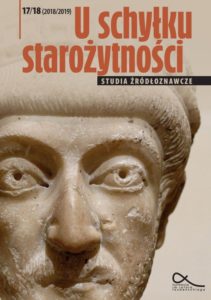Between Heaven and Earth: Family ownership versus rights of monastic communities. The Theodosian Code and late antique legal practice
Between Heaven and Earth: Family ownership versus rights of monastic communities. The Theodosian Code and late antique legal practice
Author(s): Marzena WojtczakSubject(s): Law, Constitution, Jurisprudence, Ancient World
Published by: Wydawnictwo Naukowe Sub Lupa
Keywords: monks; monasticism; Late Antiquity; Roman law; legal practice; Theodosian Code; legal capacity; Church; family; proprietary rights; donations; piae causae; voluntary poverty
Summary/Abstract: This article investigates the relationship between the legislation introduced in thefield of proprietary rights assigned to various Church entities and the practice ofaccumulation of wealth by the monastic communities in late antique Egypt. On theone hand, among the literary sources the predominant theme concerning Egyptianmonasticism is the idea of voluntary poverty and renunciation of worldly possessionsaimed at the pursuance of a contemplative life. On the other hand, the papyrioffer insight into monastic life that does not seem to have been entirely detachedfrom the outside world. In this vein, the laws of Valentinian I and Theodosius IIclearly indicate that monks and nuns continued to own property without disturbanceafter undertaking religious life. In addition, Theodosius the Great and lateremperors restricted the freedom of certain groups of citizens to disown their property,rendering the Christian ideal of voluntary poverty not always feasible. It isonly with Justinian that the rules regarding monastic poverty are shaped and set bythe secular power. The incentive for this study is to check for any conflict betweenthe principles of classical Roman law in the field of private ownership and imperiallegislation included in the Codex Theodosianus. Giorgio Barone-Adesi observed thetension that took place between the Christian communities and their corporationsthat were allotted ever broader privileges and the Roman principle of preservationof the property within the family unit. There is, however, still some room left fordiscussion since not all the data easily adds up to an unequivocal conclusion. In thisanalysis, the Code is treated as a measure for taking a stand by the legislator in thedispute between the will of the owner, recognition of the rights of the heirs andfamily members, and finally the privileges granted to the religious consortia.
Journal: U schyłku starożytności - Studia źródłoznawcze
- Issue Year: 2019
- Issue No: XVII-XVIII
- Page Range: 117-170
- Page Count: 54
- Language: English

